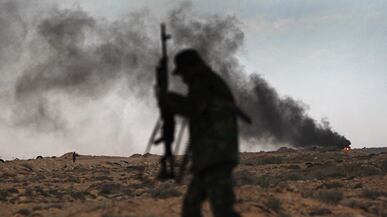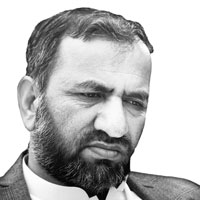Exiled Libyans with connections to Al Qaeda are racing to find ways to send people home, in hope of steering the anti-Gaddafi revolt in a radical Islamist direction, according to several senior Afghan Taliban sources in contact with Al-Qaeda.

“This rebellion is the fresh breeze they’ve been waiting years for,” says an Afghan Taliban operative who helps facilitate the movement of Al Qaeda militants between the tribal area and Pakistani cities. “Some say they are ready to go back at this critical moment.” The operative, who has just returned from Pakistan’s lawless tribal area on the Afghanistan border, adds: “They realize that if they don’t use this opportunity, it could be the end of their chances to turn Libya toward a real Islamic state, as Afghanistan once was.”
So far, Muammar Qaddafi’s clumsy efforts to blame Al Qaeda for the popular uprising against his dictatorship would be a joke, if only he weren’t using that claim as an excuse for mowing down so many Libyans. In fact, it’s been many years since Libya has seen significant numbers of radical Islamists—or any other organized opposition, for that matter. Nearly all have been killed, locked up or chased into exile years ago by the regime’s secret police and security forces. Although the country’s most feared insurgent entity, the Al Qaeda-affiliated Libyan Islamic Fighting Group (known in Arabic as Al-Jama’a al-Islamiyah al-Muqatilah bi-Libya), has been seeking to topple Gaddafi since the early 1990s, it’s unlikely that more than a handful who pledge allegiance to Osama bin Laden remain inside Libya.
Seizing the moment, however, Al Qaeda’s top ranking Libyan, Abu Yahya al-Libi, the movement’s senior Islamist ideologue and bin Laden’s head of operations for Afghanistan, broke his public silence over the Libyan revolt this past weekend. He issued a call to arms to his countrymen in a 30-minute video that was posted on Al Qaeda-linked Internet sites, urging Libyans to fight on and do to Qaddafi what he has done to them over the years: kill him. "Now it is the turn of Qaddafi [to die] after he made the people of Libya suffer for more than 40 years," he said. “Retreating will mean decades of harsher oppression and greater injustices than what you have endured." He also called for the institution of Islamic law once an Arab nation has cast off its former, Western-supported rulers. Overthrowing these Western-backed Arab regimes, he added, was "a step to reach the goal of every Muslim, which is to make the word of Allah the highest."
“This rebellion is the fresh breeze they’ve been waiting years for,” says an Afghan Taliban operative.
Several Libyans have held top roles in Al Qaeda’s leadership. Some traveled to Afghanistan in the 1980s to fight the Soviets and stayed, eventually teaming up with bin Laden after his return from Sudan in 1996. Taliban sources estimate there were some 200 Libyans with bin Laden in Afghanistan at the time of the 9/11 attacks. Since then some of bin Laden’s senior-most operational aides have been Libyans. One was Abu Faraj al-Libi, who was captured by Pakistan forces in 2005 and is now a prisoner in Guantanamo Bay; another was Abu Lais al-Libi, his replacement as Al Qaeda’s third in command, who died in a U.S. Predator attack in 2008. Apart from his hard-line sermons and jihadist exhortations that are widely distributed on DVD and posted on jihadist Website, Yahya may be be best known for his daring escape along with four [make that three other] other Al Qaeda prisoners from the high-security lockup at the American airbase at Bagram in July 2005.Yahya, who is believed to be in his late 40s, is smarter, more charismatic, a more articulate speaker and a more learned Islamic scholar than either Faraj or Lais, according to Afghan Taliban sources.
Now he’s said to be eager to go home, like most other Libyans in the Afghan borderlands. “They desperately want to at least get a foothold in the new Libya,” the Taliban facilitator says. The long, dangerous trip from Pakistan’s tribal areas to Libya—via Afghanistan, Iran, Iraqi Kurdestan and Turkey—can take weeks if not months. Nevertheless, at least one Taliban source says Yahya made the trip two years ago and returned safely, although no one else seems able to confirm that story. And even if he or other Al Qaedea Libyans manage to get home again, the Taliban facilitator says they know they’ll have a tough time influencing the largely prodemocracy uprising. “They know they must tread cautiously, and not push too hard, for too much, too soon,” he says. Instead, he says, they expect to take a moderate line at first, while quietly trying to persuade rebel leaders that the preservation of Libyan sovereignty against Western “colonialists” depends on taking an anti-Israeli, anti-American line. Any move toward imposing Islamic sharia law, Yahya’s specialty, will have to come later.
Still, Taliban sources say, if Yahya is successful in reaching rebel-held territory inside Libya, at least he’ll be able to operate with relative freedom, without worrying about Gaddafi’s secret police. There’s one question: will bin Laden grant leave to Al Qaeda’s senior operations man for Afghanistan to undertake such a hazardous journey? The betting among the Taliban is that he will—and he may already have a replacement in mind. “Al Qaeda will not leave this place empty,” says the facilitator.
Sami Yousafzai is Newsweek's correspondent in Pakistan and Afghanistan, where he has covered militancy, Al Qaeda and the Taliban for the magazine since 9/11. He was born in Afghanistan but moved to Pakistan with his family after the Russian invasion in 1979. He began his career as a sports journalist but switched to war reporting in 1997.
Ron Moreau is Newsweek’s Afghanistan and Pakistan correspondent and has been covering the region for the magazine the past 10 years. Since he first joined Newsweek during the Vietnam War, he has reported extensively from Asia, the Middle East and Latin America.







